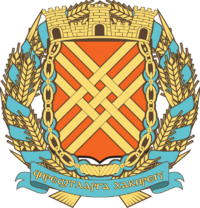Mirage (Girbeta)
This article is incomplete because it is pending further input from participants, or it is a work-in-progress by one author. Please comment on this article's talk page to share your input, comments and questions. Note: To contribute to this article, you may need to seek help from the author(s) of this page. |
| National Intelligence Agency ⲙⲓⲗⲓ ⲣⲁⲍvⲉⲭⲁ ⲁϣⲉⲛⲧⲗⲩⲅⲩ Romanized: Milli Razvedka Agentlygy Agence Nationale de Renseignement | |
 The Manara, home of Mirage Headquarters in Saybäketle | |
| Agency overview | |
|---|---|
| Formed | December 22, 1967 |
| Preceding |
|
| Jurisdiction | Girbeta |
| Motto | "ⲕⲁⲣⲁⲅⲩⲗⲩⲕⲧⲁⲛ, ⲏⲁⲕϯⲗⲩⲕ ϧⲩⲅⲁϣⲁⲕ" ("Out of darkness, we will bring light") |
| Employees | 4,195 (2017) |
| Minister responsible |
|
| Agency executives |
|
| Parent agency | Office of the Executive Secretary |
| Key document |
|
Mirage (Girbetese: ⲙⲓⲣⲁϣⲉ), a portmanteau of Milli Razvedka Agentlygy (Girbetese: ⲙⲓⲗⲓ ⲣⲁⲍvⲉⲭⲁ ⲁϣⲉⲛⲧⲗⲩⲅⲩ; meaning "National Intelligence Agency") is the national foreign intelligence service of the Tichvaist Union of Girbeta, directly subordinate to the Office of the Executive Secretary. Mirage headquarters is located in central Saybäketle, and is commonly called "the Manara" (Girbetese: ⲙⲛⲁⲣⲁ; "the Tower"). As of its last audit in 2017, it employed 4,195 personnel. It is the largest and primary component of the Girbetese intelligence community.
The precursor to Mirage was JOK Unit 8, a special classified department of the National Police run directly from the office of the Executive Secretary in the immediate aftermath of the 1957 Coup which ousted the monarchy that same year. Originally intended as a means of dismantling pro-monarchist and extremist factions taking advantage of the political climate, the neccessity of a more substantial means of collecting and controlling intelligence became of increasing importance to the Girbetan government as the Cold War continued to affect the Tichvaist Union's development. Since is establishment in 1967 under the Defense of the Union Act, Mirage has been regarded as the foremost intelligence service in the South Seas region and much of the southern !Atlantic rim, and is one of the foremost bodies in enforcing maritime law in international waters therein.
Mirage today primarily acts as an early warning system to alert the Girbetese government to threats to the nation's interests from abroad. It relies heavily on wiretapping and electronic surveillance of international communications. Its main focuses in modern times generally revolve around combatting international non-state terrorism, proliferation of weapons of mass destruction, illegal transfers of technology, organized crime, smuggling (primarily of weapons and narcotics), human trafficking, information warfare, and corporate espionage. As the Union's sole foreign intelligence service, Mirage gathers both civil and military intelligence. Its military counterpart, the Reconnaissance Command Center of the Girbetese Armed Forces (Rahähue) also fulfills these missions in their own capacities, though is not itself an intelligence service. There is significant close cooperation between Mirage and Rahähue.
